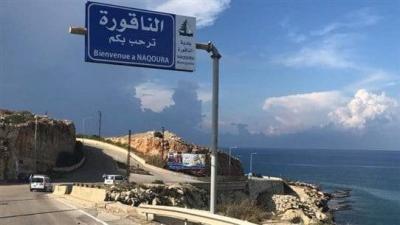A Lebanese official delegation is expected to travel today to the Naqoura area at the border with Israel to hand over to the American mediator Amos Hochstein and the United Nations a signed letter from President Michel Aoun, which includes approval of the border demarcation in its final form. Meanwhile, the maritime border demarcation with Syria has taken on a new level of complexity after the Syrian side canceled a planned visit for a Lebanese political delegation to Damascus, claiming that Lebanon was hasty in scheduling it without prior coordination with Damascus.
It is notable that the Lebanese army was excluded from these two essential situations, even though the military institution is directly involved in technical negotiations. In light of circulating information suggesting that the army distanced itself from these matters, a prominent security source expressed puzzlement regarding claims that the army refused to engage in maritime border demarcation discussions. The source explained to "Asharq Al-Awsat" that "the political authority is the one that sidelined the army from this task." They stated, "Regarding the maritime border demarcation with Israel, the army was tasked by the authority with the negotiation mission and identified the line 29 as a negotiation point, providing evidence and documents that prove it falls under Lebanese sovereignty, safeguarding the state and people's rights to the resources beneath it. However, the political leadership withdrew this file from the army's hands and agreed with the American mediator on line 23 as a negotiation point without providing justifications," noting that "when the politicians consulted the army after the agreement with the American mediator, the leadership assigned the head of the army's hydrography unit, whose role ended there after mapping the points."
It is striking that the army's exclusion from southern maritime border negotiations also extended to the northern border with Syria, especially since the delegation formed by President Aoun, which included ministers and figures from his political team and was supposed to head to Syria, lacked a representative from the military institution. The security source revealed that "the politicians did not ask the army for its opinion nor for its maps and coordinates related to the border with Syria," considering that "the claims suggesting that the army commander refused to engage in negotiations are incorrect." They asserted that it is unreasonable to assign the army a national mission and then hesitate to execute it.
The exclusion of the military institution has raised concerns among Lebanese citizens regarding the backgrounds of this decision. However, sources familiar with the atmosphere at the presidential palace justified the absence of a military representative, explaining that "no Lebanese officer will participate in the delegation heading to Naqoura, as there are no technical discussions requiring the presence of military experts." They confirmed to "Asharq Al-Awsat" that "all that is happening is that a civilian delegation (whose members' names were not specified as of last night) will deliver the letter signed by the President to Hochstein and a UN team in Naqoura, to become an officially recognized document by the international organization, affirming Lebanon's rights to its resources." They pointed out that "the army played a fundamental and active role during the indirect negotiation sessions held between Lebanon and the Israeli side last year." The sources emphasized that "there will be no signing of any document from the Lebanese side in Naqoura, but merely the transfer of the letter signed by the President to Hochstein and the UN team."
It is noteworthy that the military’s exclusion deviates from what occurred in similar occasions; for instance, the ceasefire agreement between Lebanon and Israel was signed by two Lebanese army officers, Major Tawfiq Salem and Captain J. Harb, on March 23, 1949. Additionally, the April understanding that concluded the Israeli “Grapes of Wrath” war against Lebanon was signed by the army on the Lebanese side on April 26, 1996.
Retired Army Colonel Bassam Yassine, who led the military delegation that engaged in indirect negotiations with Israel, found no explanation for excluding the army from the delimitation negotiations with Syria or from the negotiation process that took place between the American mediator and the Lebanese leadership. He told "Asharq Al-Awsat": "The political leadership that managed the negotiations holds the answers, not any other party." In his interpretation of the reasons for not including a technical and military team in the Lebanese delegation heading to Syria to discuss maritime demarcation, Colonel Yassine stated that he "does not have information on whether the political delegation is going for direct negotiations or to open the door for Lebanese-Syrian negotiations." He noted that "the army and its technical and engineering teams are the ones determining the maps and coordinates, after which the political authority concludes the agreement."




